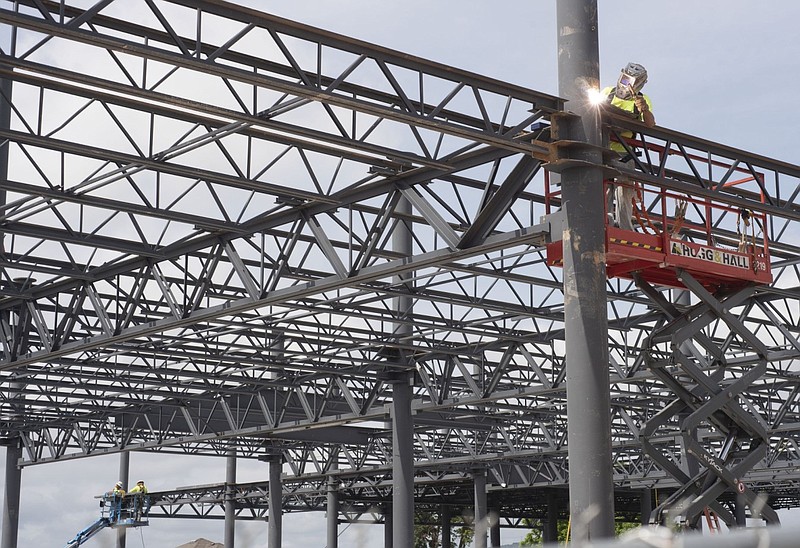ROGERS -- Northwest Arkansas' labor force has recovered from the pandemic recession and is even slightly ahead of where it was before covid, economists said Thursday at the annual Arkansas Business Forecast luncheon.
Experts on the global, U.S. and regional economies shared their perspectives on pandemic recovery and inflation. None said they see a recession on the horizon.
The standing-room-only event at the Rogers Convention Center was presented by the Center for Business and Economic Research, part of the University of Arkansas' Walton College of Business.
Julia Coronado, founder of the economic research firm MacroPolicy Perspectives, said the pandemic tested the resiliency of economies around the world. The U.S. had the strongest recovery globally, she said, thanks in part to a particularly resilient labor market.
"Countries had different degrees of unemployment during the pandemic, but developed economies recovered quickly and labor markets have been resilient through the 2022 slowdown," Coronado said.
The supply chain is still struggling to return to normal, Coronado said, but "improved supply-side functioning and commodity relief are easing pipeline pressures."
Coronado said some clouds on the horizon around the world include China's economy slowing after two decades of driving global growth. On the other hand, India is emerging as a growing market with a younger population eager to embrace new technology.
Also, she said the war between Ukraine and Russia could cause a lasting disruption to Europe's economy.
Overall, Coronado said, the global economy faces headwinds this year from tighter fiscal and monetary policy, a war, and global fragmentation.
"Global disruption remains high," she said, "and we are unlikely to return to an era of low volatility."
But global economies also will benefit from cooling inflation, "supply-side healing," and labor market resiliency, Coronado said.
"Improved supply-side functioning and renewed price sensitivity for consumer goods is bringing inflation down," she said.
John List, Walmart's chief economist and a professor of economics at the University of Chicago, also rejects the idea that the United States is heading into a recession.
List studied the trends seen in the nation's last 10 recessions and said the country's current economic position bears no resemblance to those periods.
While unemployment rates typically rise during recessions, the U.S. unemployment rate has dropped from 4% to 3.5% since the beginning of 2022.
Underemployment, when more people who want full-time work end up taking part-time jobs, also rises during recessions. But List said underemployment in 2022 was the lowest it's been in the past 20 years.
The only negative, he said, is that the number of people in the labor force generally declines during recessions. And after growing consistently in 2021, the labor force participation rate stayed mostly flat during 2022.
The bottom line, List said, was "while the labor participation rates may give some pause, wage growth, underemployment numbers and hiring rate data all paint a much brighter picture."
"Going forward -- who knows," he said. A lot depends on the Federal Reserve, which has raised interest rates dramatically in 2022 in an effort to curb inflation.
Finally, Mervin Jebaraj, director of the Center for Business and Economic Research, showed through a series of charts how Arkansas and the Northwest region in particular fared during the pandemic.
Arkansas' unemployment rate in the early months of the recession was half that of the United States, Jebaraj said. And Northwest Arkansas is the only one of the state's six metro areas to see its labor force not only recover from the losses of the last couple of years but actually exceed it by the end of 2022.
Besides Northwest Arkansas, the metro areas identified by the Census Bureau are Central Arkansas, Fort Smith, Jonesboro, Pine Bluff and Hot Springs.
The housing market has seen price corrections around the country, Jebaraj said. But that's not been the case in Northwest Arkansas, where he doesn't foresee any dramatic decreases in home prices.
Though they dropped slightly after peaking in June, home prices have remained high since then, he said, and he expects them to remain high. The reason Northwest Arkansas is bucking the national trend is the large numbers of people who continue to flock to the region.
Jebaraj said that investors are no longer the largest buyers of real estate in Northwest Arkansas. Instead, buyers now are people moving to the region.
Not enough homes and apartments have been built over the last few years to accommodate this influx, he said. The tight housing market will keep home prices high, he said.

